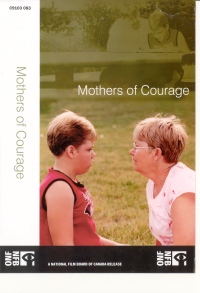| ________________
CM . . .
. Volume XI Number 9 . . . .January 7, 2005
Parenting any child is a challenge at the best of times. What would a parent do when the child is born hydrocephalic, diagnosed blind at four months, has cerebral palsy, is autistic and epileptic? In Mothers of Courage, this is not a hypothetical situation for Marlene, as her daughter Bethany's life has been challenged by these realities. Marlene states early in the film, "When you have a child who is so close to mortality, you see things differently." The film enters into this family and shows first-hand what a regular day entails. Marlene admits that when Bethany was born, she felt that she had to do everything for her daughter. While her intentions were good, she eventually realized that this was impossible and now feels that perhaps she neglected the rest of her family in order to provide for Bethany. She encourages parents in this situation to use the help of others and seek out the social services which exist. However, she makes clear that many of the services which should exist are bundled up in layers of red tape. She points out that many of the health necessities for Bethany, such as braces, cost extra. Alternate treatments of acupuncture and massage, which help Bethany, are not covered at all. Hyperbaric chamber sessions provide relief for Bethany but are not approved by the government. These have cost the family $10,000 so far. While Bethany fights through each day, the family also has to struggle to enable her to maximize her ability. Over the years, Marlene has become a fighter for the rights of other families with special needs children. Living as they do, in a smaller community, access to assistance is limited. This is true for Taylor, a young boy with Oppositional Defiance Disorder, and his mother who is in distress over what needs to be done with her child. Taylor is shown lashing out verbally and physically at his mother and his teacher. No support exists at the school level as he is totally segregated from the other children. On a day when the school is away at a field trip, Taylor is alone in the school. A difficult and demanding child, he is clearly in need of support. His mother is beyond frustrated. Marlene guides her through the bureaucracy and the stalling techniques used by the school board. She offers to attend meetings with her. She knows the landscape and is able to assist others. Marlene's husband states that Bethany has brought out a more aggressive side in his wife. She has become an expert in getting things done. However, it is still difficult. Each time a service/care contract has to be renewed for Bethany, the family is buried in paperwork. Some contracts have to be renewed every three months. Marlene states that they are made to feel like they are asking for a handout. Waiting for assessments nearly drives her insane. She fought hard to get Bethany included in a regular classroom and is presently pleased by the successes of the year Bethany has had with the other students. They are very accepting and inclusive. Bethany's birthday party shows a group of children having fun together. The adults seem to have the most difficulty. Marlene's demands are simple. She wants Bethany to be a part of her community, and she wants her daughter's abilities maximized. Bethany has told her mother that she wants to go to school, go to college, get a job and then retire. Mothers of Courage is a clear presentation of the difficulties shared by children with special needs and their families. Society's perception is often a barrier as well. Bethany's father reveals that a number of their friends stopped coming by after Bethany was born. No solutions are magically provided. What will happen to Bethany is unknown. We do not know if Taylor and his mother get the help they need. However, there is no question that something is badly lacking. This is a moving presentation and can be used at all levels in any high school class that looks at the individual in society such as Parenting, Civics, Ethics, or Law. Highly Recommended. Frank Loreto is a teacher-librarian at St. Thomas Aquinas Secondary School in Brampton, MB.
To comment
on this title or this review, send mail to cm@umanitoba.ca.
Copyright © the Manitoba Library Association. Reproduction for personal
use is permitted only if this copyright notice is maintained. Any
other reproduction is prohibited without permission.
NEXT REVIEW |
TABLE OF CONTENTS FOR THIS ISSUE
- January 7, 2005.
AUTHORS |
TITLES |
MEDIA REVIEWS |
PROFILES |
BACK ISSUES |
SEARCH |
CMARCHIVE |
HOME |
